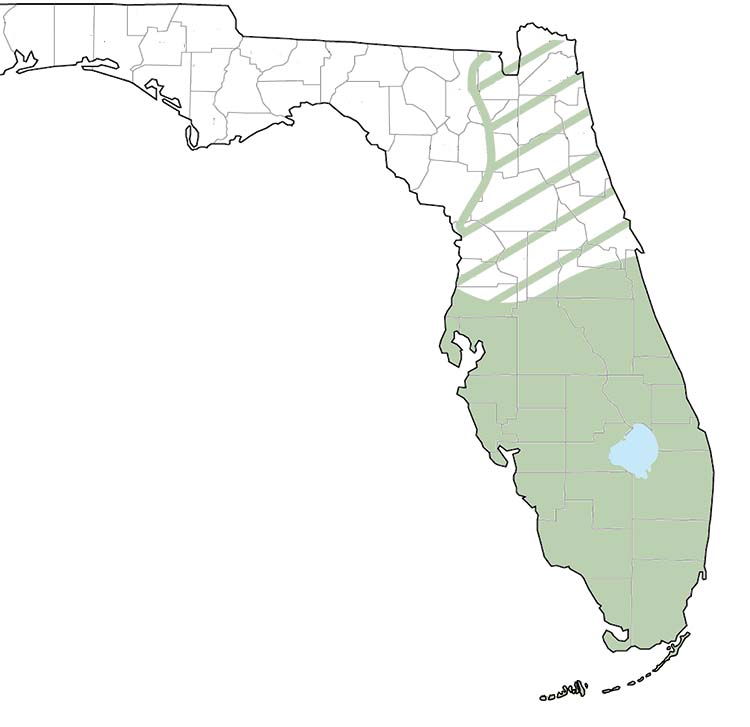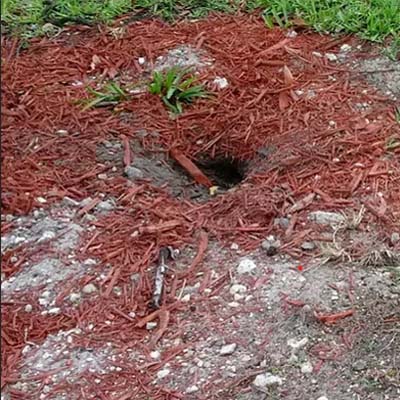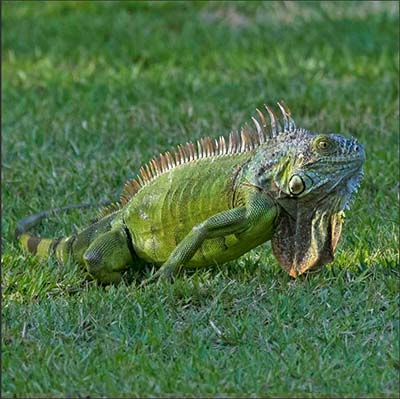Iguanas in the United States
Common Type: Green Iguana
Commonly Found: Southern Florida
Current Status: Invasive
Avg. Size: 5-7 Ft. Long
Danger: Bites Contain Diseases
Life Span: 10 - 19 Years
Green Iguanas, like most invasive species in Florida, were once pets that were either abandoned or lost by their previous owners and increased in population immensely. These pests are currently ravaging the native vegetation and wildlife and can cause damage to sidewalks, home foundations, seawalls, and the banks of canals. Their feces are rampant and can be found in many locations, of which, carry to bacteria Salmonella. Iguanas vary in size, color, and behavior immensely. But in the United States, the 2 Iguana species that are propagating in the wild are the Green Iguana and the Spiny-tailed Iguana which is not an invasive species. The Green Iguana is one of the largest iguanas in the world. An adult can grow as large as 1.7 meters long. Despite their name, Green Iguanas do not have to be green they can be green, lavender, brown, black, or even bright blue. Although, most of the Iguanas in Florida are Green, Brownish Grey, and in some cases, Orange. Iguanas, while compared to their other reptile brethren are not dangerous or aggressive animals. But like most animals, they still need to be approached with caution. Iguanas when threatened can bite and their serrated teeth and strong bite can cause deep cuts. This can be life-threatening to small children and pets. However, if you are bitten, immediately rinse the wound vigorously and wash it with hot soapy water, and then seek medical attention. Iguanas can carry Salmonella, which can cause a severe infection if it is not treated right. Iguanas can carry Salmonella within their fresh feces as well, make sure to clean any surface, and do not let it get into an open wound.
Green Iguanas Are Invasive Pests in the United States
 The Green Iguana is not native to the United States and is considered an invasive species by the Government. In Florida, Iguanas must be killed humanely and if in private property, must have permission from the current landowner. They can be killed year-round without a permit or a hunting license. It is unlawful to keep Green Iguanas as Pets.
The Green Iguana is not native to the United States and is considered an invasive species by the Government. In Florida, Iguanas must be killed humanely and if in private property, must have permission from the current landowner. They can be killed year-round without a permit or a hunting license. It is unlawful to keep Green Iguanas as Pets.Description
 Iguanas are one of the largest lizards found in the Americas. They can easily be identified by being rather stocky, having saggy skin, spines across their back, and having a whip-like tail. Iguanas are cold-blooded and prefer warmer and moist climates such as Central America, and now recently, Southern Florida.
Iguanas are one of the largest lizards found in the Americas. They can easily be identified by being rather stocky, having saggy skin, spines across their back, and having a whip-like tail. Iguanas are cold-blooded and prefer warmer and moist climates such as Central America, and now recently, Southern Florida.Range

According to EDDMapS (www.eddmaps.org), Green Iguanas are usually found in Southern and Central Florida, but they can be found in all parts of Florida, but there haven't been many sightings near the panhandle due to the colder temperatures in that area. Green Iguanas are common in suburban areas due to the warm asphalt and concrete, but they also tend to inhabit the mangroves and pinelands. They are also seen near the canals and levees, which is a large contributing factor to their explosive growth.Dangers of Iguanas
Frequently Asked Questions
Iguanas in Florida do not fall under any of the State's animal protection laws. However, they are still subject to anti-cruelty laws and must be killed humanely on the property they are found in, with the landowners' permission. Iguanas must be killed on the property and they cannot be relocated or released in Florida. We highly recommend that you should be careful when killing iguanas as their bites can cause injury and infection. Please call us at Animal Control Solutions to remove these pests quickly, and safely. If you have proof before April 29th 2021, that you owned and have an Iguana as a pet you will be fine. However, they must be chipped, similar to how dogs are for identification. If you have an iguana that you cannot keep, do not worry as you do not need to get it euthanized. you can surrender it for adoption through Florida's Wildlife Commission's Exotic Pet Amnesty Program where they will find a home for your Iguana. Iguanas like your home because they find it easy and relaxing to live in, remove these factors and they will disappear. The easiest way is to remove plants that attract them, fill in the burrowed holes, wind chimes, and hang reflective surfaces around your yard has been shown to help. No they do not! Iguanas are herbivores so their jaw strength is not that strong to bite off your finger. However, their teeth are serrated and can cause cuts and damage to Adults. The bites will be more serious if they bite children or pets, so keep them away from wild iguanas! Yes they do! Iguanas will lose their tails if captured by predators (and Humans!). The tail will grow back in time, and is not life-threatening to the IguanaCan I Remove the Iguanas Myself?
I Currently Own an Iguana Do I have to Give it Away?
What Can I Do To Keep Iguanas Away?
Can an Iguana Bite Your Finger Off?
Do Iguana's Lose Their Tails?




